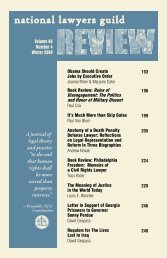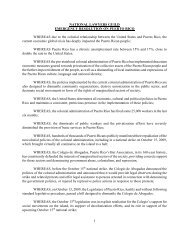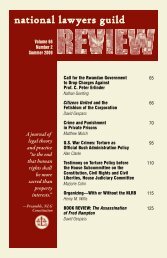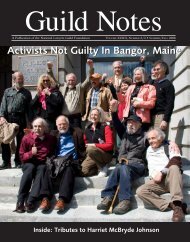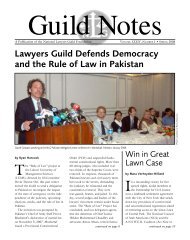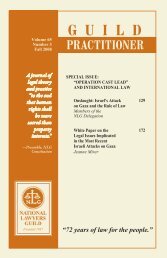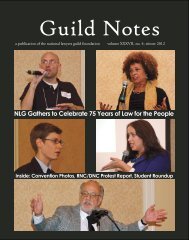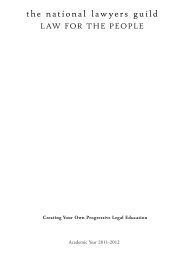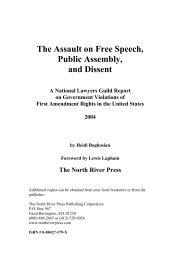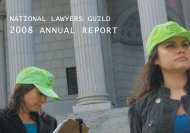NLGRev 68-2[1].indd - National Lawyers Guild
NLGRev 68-2[1].indd - National Lawyers Guild
NLGRev 68-2[1].indd - National Lawyers Guild
Create successful ePaper yourself
Turn your PDF publications into a flip-book with our unique Google optimized e-Paper software.
86 national lawyers guild review<br />
In its report for Cuba, the Committee acknowledged not only the increase<br />
in prostitution but also the need to attack the root causes of prostitution and<br />
provide rehabilitative programs for the women involved, citing programs<br />
that promote economic independence in women as particularly effective. 174<br />
The Committee again urged the State to assess the effectiveness of its preventative<br />
measures and to align them with Article 6 of the Convention. 175<br />
Legalizing prostitution does not attack these root causes, but feeds on the<br />
women’s economic desperation.<br />
Part III: Legalized prostitution violates key provisions of the UN<br />
Convention on the Elimination of All Forms of Discrimination<br />
Against Women (CEDAW)<br />
The CEDAW Committee has recognized explicitly, as required by Article<br />
6, that prostitution exposes women to violence and exploitation. 176 As such,<br />
women are exposed to increased violence, crime victimization, and health<br />
risks, which are key targets of CEDAW’s goal to eliminate gender inequality.<br />
There is a stark contrast between countries with legalized prostitution<br />
and criminalized prostitution in terms of the promotion of gender rights. On<br />
one hand, the abuse of women has become so entwined in Thailand that it<br />
makes up 4.3 billion dollars per year. 177 The sale and abuse of women’s bodies<br />
that contributes to the maintenance of the Thai government and society<br />
for the benefit of men can be described as nothing but exploitation. The<br />
World Trade Organization has suggested counting the proceeds in the gross<br />
national product, suggesting that exploitation and abuse should be counted<br />
as legitimate profit. The result of the situation in Thailand is indicated by the<br />
CEDAW Committee’s Concluding Observations, namely the concern “[t]hat<br />
traditional attitudes that foster discrimination against women and girls continue<br />
to prevail and to hinder the full implementation of the Convention.” 178<br />
Rather than tackling the serious problem of discrimination against women<br />
in Thai society, the government compounds the problem by condoning the sale<br />
of women as objects for the use of men, which infects the entire culture and<br />
prevents the implementation of the CEDAW principles in the country. When<br />
women are commodities, they need be treated no better than other marketed<br />
products. Legalizing the sale of women only increases the problem, as the<br />
Committee has found. 179 Legalization allows for sex services to be advertised<br />
in daily newspapers, which significantly increases prostitution.<br />
On the other hand, countries that criminalize prostitution have stronger<br />
records of preventing violence against women and children. In the 2001 remarks<br />
regarding Finland, the Committee pointed out not only that violence<br />
against women is a very serious human rights problem, but also that the<br />
government took it seriously and criminalized the buying of sexual services


![NLGRev 68-2[1].indd - National Lawyers Guild](https://img.yumpu.com/30820772/24/500x640/nlgrev-68-21indd-national-lawyers-guild.jpg)
